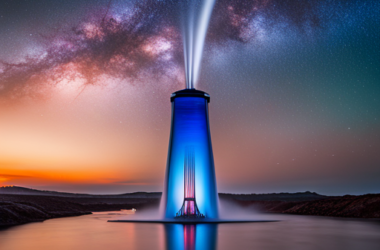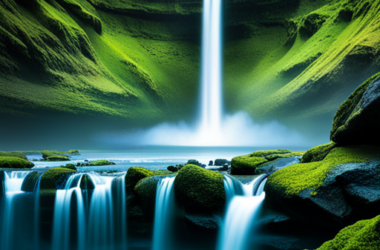Update Notice!
This Article Was Updated on 10/12/2024
Water is essential for life, yet many people overlook its role in shaping society. Through film, You can explore how water issues impact communities around the globe. By watching these documentaries, you will gain insights into the complex relationship between water and societal challenges.
 From environmental concerns to political struggles, the stories told in these films highlight our need for responsible water management. Engaging with these documentaries enhances my understanding and sparks important conversations about sustainability and conservation.
From environmental concerns to political struggles, the stories told in these films highlight our need for responsible water management. Engaging with these documentaries enhances my understanding and sparks important conversations about sustainability and conservation.
1. Flow: For Love of Water
“Flow: For Love of Water” is a powerful documentary that investigates the global water crisis. Directed by Irena Salina, it addresses the increasing privatization of the world’s fresh water supply. The film highlights how vital water is for life and the risks we face if we take it for granted. Salina presents compelling evidence about pollution and its impact on communities.
Throughout the documentary, I see interviews with experts and activists who share their concerns. They warn about the dangers of treating water as a commodity. The film encourages viewers to think about water access as a basic human right. It pushes for awareness and action to protect this essential resource.
“Flow” serves as a wake-up call to those unaware of the water crisis. It combines facts with emotional stories to engage and educate the audience. This documentary is essential viewing for anyone interested in environmental issues and human rights. By watching, I gained a deeper understanding of how interconnected water, politics, and society are.
“Flow: For Love of Water” remains relevant, urging us to take action for a sustainable future.
2, Blue Gold: World Water Wars
“Blue Gold: World Water Wars” is a documentary that highlights the global water crisis. Directed by Sam Bozzo, it explores how human activity threatens the world’s fresh water supply. The film is based on the book by Maude Barlow and Tony Clarke.
It emphasizes the impact of pollution, overdevelopment, and corporate control over water resources. Throughout the documentary, various examples illustrate the struggle for access to clean water. The filmmakers show how this fight affects communities and ecosystems around the world. This documentary raises awareness about the importance of protecting water as a vital resource.
It calls for action to secure clean water for future generations. Viewing “Blue Gold: World Water Wars” can inspire viewers to think critically about their water usage and advocate for sustainable practices. The film delivers a clear message about the urgent need to address water shortages globally.
3, Tapped
Tapped is a powerful documentary that explores the bottled water industry and its impact on society and the environment. Directed by Stephanie Soechtig, the film highlights how bottled water affects our health, the environment, and our economy. The documentary exposes key issues related to water privatization and the effects of corporations like PepsiCo and Nestlé.
It reveals the hidden costs of bottled water, including pollution and climate change. Tapped also features interviews with activists and experts who discuss the reliance on bottled water. They argue for better access to clean tap water and the need for more efficient water conservation methods. Viewers of Tapped come away with a deeper understanding of how the bottled water industry influences our society.
This film encourages critical thinking about our water choices and their longer-term effects on our planet.
4, Last Call at the Oasis
“Last Call at the Oasis” is a powerful documentary that addresses the global water crisis. The film highlights the importance of water in our lives and the challenges ahead. It features well-known activist Erin Brockovich and experts like Peter Gleick. They share insights on the current water system and its flaws. The documentary presents real-life stories of communities facing severe water shortages. It sheds light on innovative solutions being implemented by individuals and groups.
Through interviews and investigation, I learned about the urgent need for action. The film encourages viewers to think critically about water usage and conservation. “Last Call at the Oasis” is impactful because it combines science and human experience. It makes the viewer aware of how critical clean water is for our society.
This documentary is not only informative but also a call to action for everyone.
5, Watermark
“Watermark” is a visually stunning documentary directed by Jennifer Baichwal and Edward Burtynsky. It explores the complex relationship between humanity and water across the globe. The film features breathtaking cinematography that captures both the beauty and the challenges related to water. It shows how water shapes our societies and, in turn, how we impact water resources.
Throughout “Watermark,” viewers witness various water-related issues, from urban environments to rural areas. The film highlights the significance of water as a crucial resource for life. The documentary prompts reflection on our responsibilities toward sustainable water management. It emphasizes the urgent need to address water scarcity and pollution.
By blending both art and documentary storytelling, “Watermark” engages audiences emotionally and intellectually. It underscores the importance of understanding our connection to this precious resource.
Understanding The Nexus Of Water And Society
 Water plays a critical role in shaping societies throughout history. It influences social structures, economic systems, and even political dynamics. I will explore how historical usage affects current practices and how water serves as a driver of socioeconomic conditions.
Water plays a critical role in shaping societies throughout history. It influences social structures, economic systems, and even political dynamics. I will explore how historical usage affects current practices and how water serves as a driver of socioeconomic conditions.
The Historical Perspective Of Water Usage
Throughout history, water has been a central resource for civilization. Ancient societies flourished near rivers and lakes, utilizing these bodies for drinking, agriculture, and trade. The development of irrigation systems transformed desert regions into productive farmland, supporting larger populations.
The control of water sources has often led to power struggles. For example, empires built extensive canal systems to manage resources. This created both economic opportunities and social hierarchies, affecting the distribution of power. In more recent times, the impact of industrialization on water sources has raised concerns about pollution and depletion.
Water As A Socioeconomic Driver
Water access directly impacts economic development and quality of life. In many regions, limited clean water hinders agricultural production, which can lead to poverty. Communities without reliable water sources face significant health risks and economic challenges. The privatization of water services has also emerged as a pressing issue.
When corporations control water supply, the costs may rise, making it unaffordable for some. This can deepen social divides, as wealthier communities secure better access while marginalized groups struggle. Understanding these connections is vital for addressing future challenges in water management.
By analyzing both historical and socioeconomic facets of water, I can better grasp its essential role in society today.
Environmental And Societal Impacts
 Water plays a crucial role in both our environment and society. Understanding the effects of water scarcity and the importance of conservation can illuminate the challenges we face today.
Water plays a crucial role in both our environment and society. Understanding the effects of water scarcity and the importance of conservation can illuminate the challenges we face today.
Water Scarcity And Its Consequences
Water scarcity affects billions of people worldwide. It can lead to serious health issues, including malnutrition and disease, especially in developing countries. When water is limited, agriculture suffers, impacting food production. This can create economic instability and increase poverty levels. Without enough water, industries also struggle, leading to job losses and reduced economic growth.
Key Consequences of Water Scarcity:
- Increased competition for resources
- Declining agricultural yields
- Health crises due to contaminated water supplies
- Heightened potential for conflicts over water access
These factors create a cycle of hardship, affecting social systems and community well-being. It’s essential for society to address these impacts through informed policies and practices.
Conservation And Sustainable Practices
Conservation efforts are vital to managing our water resources. Simple practices at home can make a significant difference. Using water-saving fixtures and fixing leaks are easy steps everyone can take.
Top Conservation Practices:
- Collecting rainwater for irrigation
- Utilizing efficient watering techniques, like drip irrigation
- Reducing water use in landscaping with drought-resistant plants
- Educating communities about water-saving measures
Sustainable practices not only help preserve water but also promote long-term ecological balance. By working together, we can protect our water resources for future generations, enhancing both environmental health and societal resilience.
Frequently Asked Questions
 Many people have questions about documentaries that focus on water and its impact on society. Below are some common inquiries that cover various aspects such as conservation, access issues, and the relationship between bottled water and the environment.
Many people have questions about documentaries that focus on water and its impact on society. Below are some common inquiries that cover various aspects such as conservation, access issues, and the relationship between bottled water and the environment.
What are some highly rated documentaries about water conservation?
Some highly rated documentaries include Flow: For Love of Water, which highlights the challenges of water scarcity, and Blue Gold: World Water Wars, focusing on global water rights. These films offer valuable insights into conservation efforts and the importance of protecting water resources.
Which documentaries on Netflix explore the relationship between society and water usage?
On Netflix, Tapped examines the bottled water industry and its effects on society and the environment. Last Call at the Oasis addresses the broader issues of water management and conservation in urban settings, making it a must-watch for understanding water usage.
Which BBC documentaries focus on global water issues?
The BBC has produced several impactful documentaries about water. One notable title is Water: The Forgotten Resource, which explores the global water crisis. These documentaries often include expert interviews and real-life impacts of poor water management.
Where can I find documentaries about the impact of bottled water on the environment?
Documentaries like Tapped and Blue Gold: World Water Wars discuss the consequences of bottled water on the environment. These films reveal how plastic waste and resource depletion can harm ecosystems. You can find them on various streaming platforms and rental services.
What documentaries discuss the challenges of drinking water access around the world?
Flow: For Love of Water provides an in-depth look at global drinking water access issues. Additionally, Watermark shares personal stories of communities affected by water scarcity, highlighting the struggle for clean water in different regions worldwide.
Are there any documentaries that cover the processes of water treatment plants?
Last Call at the Oasis touches on the importance of water treatment in urban settings. It reviews how treatment plants work and the challenges they face. This documentary gives an inside look at the processes that help provide clean drinking water.



